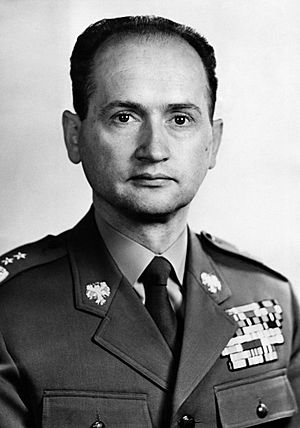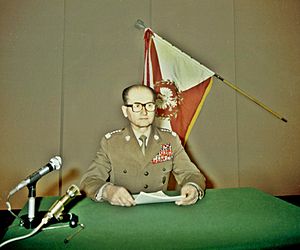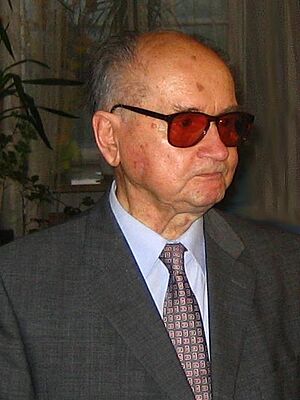Wojciech Jaruzelski facts for kids
Quick facts for kids
Wojciech Jaruzelski
|
|
|---|---|
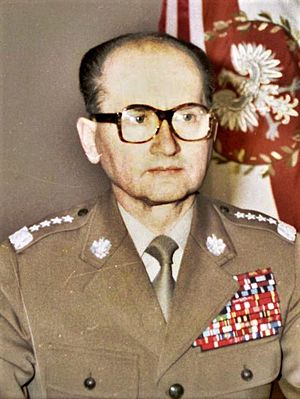
Jaruzelski in 1981
|
|
| President of Poland | |
| In office 19 July 1989 – 22 December 1990 |
|
| Prime Minister | |
| Preceded by | Office restored |
| Succeeded by | Lech Wałęsa |
| First Secretary of the Polish United Workers' Party |
|
| In office 18 October 1981 – 29 July 1989 |
|
| Prime Minister |
|
| Preceded by | Stanisław Kania |
| Succeeded by | Mieczysław Rakowski |
| 6th Chairman of the Council of State | |
| In office 6 November 1985 – 19 July 1989 |
|
| Prime Minister |
|
| Deputy |
|
| First Secretary |
|
| Preceded by | Henryk Jabłoński |
| Succeeded by | Office abolished; Himself as President |
| Prime Minister of Poland | |
| In office 11 February 1981 – 6 November 1985 |
|
| First Secretary |
|
| Preceded by | Józef Pińkowski |
| Succeeded by | Zbigniew Messner |
| Minister of National Defence | |
| In office 11 April 1968 – 22 November 1983 |
|
| Preceded by | Marian Spychalski |
| Succeeded by | Florian Siwicki |
| Personal details | |
| Born |
Wojciech Witold Jaruzelski
6 July 1923 Kurów, Poland |
| Died | 25 May 2014 (aged 90) Warsaw, Poland |
| Resting place | Powązki Military Cemetery, Warsaw |
| Political party |
|
| Spouse |
Barbara Jaruzelska
(m. 1961) |
| Children | Monika Jaruzelska |
| Signature |  |
| Military service | |
| Allegiance | |
| Branch/service | |
| Years of service | 1943–1991 |
| Rank | General |
| Battles/wars | |
Wojciech Witold Jaruzelski (born July 6, 1923 – died May 25, 2014) was a Polish military general and politician. He was a very important leader in Poland from 1981 to 1989. During this time, Poland was known as the Polish People's Republic.
Jaruzelski held several top positions. He was the First Secretary of the Polish United Workers' Party, which was the main political party, from 1981 to 1989. This made him the last leader of the Polish People's Republic. He also served as Prime Minister from 1981 to 1985. Later, he was the Chairman of the Polish Council of State from 1985 to 1989. For a short time, from 1989 to 1990, he was the President of Poland. He was also the last commander-in-chief of the Polish People's Army.
Jaruzelski was born into a Polish noble family in Kurów. During World War II, his family was sent to Siberia by the Soviet secret police (NKVD). There, he had to do hard labor in the forests. This work caused him to develop a serious eye condition called photokeratitis. Because of this, he had to wear dark sunglasses for the rest of his life.
In 1943, Jaruzelski joined the new First Polish Army. He fought with the Soviet Union against Nazi Germany on the Eastern Front. He took part in important battles, including the liberation of Warsaw and the Battle of Berlin. After the war, he continued his military career and became Poland's Minister of Defence in 1968.
In 1981, Jaruzelski became the leader of Poland. At that time, Poland was facing big economic problems. There were shortages of basic goods, and people were unhappy. The Solidarity union, which was against the communist government, was growing very strong. This worried the Polish government and the Soviet Union. To stop the anti-communist protests and prevent a possible Soviet invasion, Jaruzelski declared martial law in Poland on December 13, 1981. This meant the military took control, and there were curfews and travel limits. Martial law lasted until July 22, 1983.
By the late 1980s, the communist government's power was weakening. During the revolutions of 1989 in Eastern Europe, Jaruzelski supported changes that led to more freedom in Poland. He resigned after the Polish Round Table Agreement, which allowed for multi-party elections. He was briefly President of Poland but had little real power. In 1990, Lech Wałęsa became the first president elected by popular vote.
Today, Jaruzelski is still a debated figure in Poland. Some people criticize him strongly for imposing martial law, during which many opposition activists were imprisoned.
Contents
Early Life and World War II Experiences
Wojciech Witold Jaruzelski was born on July 6, 1923, in Kurów, Poland. His family belonged to the Polish nobility. His father was an agronomist, which means he studied farming. Wojciech went to a Catholic school in Warsaw from 1933 to 1939, where he received a strict religious education.
World War II began in September 1939 when Germany invaded Poland. Sixteen days later, the Soviet Union also invaded. Poland was defeated and divided between Germany and the Soviet Union. Jaruzelski and his family fled to Lithuania. However, Lithuania was later taken over by the Soviet Union. In June 1941, Jaruzelski and his family were captured by the Soviet army and sent to Siberia.
At the railway station, Jaruzelski was separated from his father, who was sent to a labor camp (gulag). Wojciech and his mother traveled for a month to Biysk. After that, Jaruzelski had to walk about 180 kilometers (112 miles) to Turochak. There, he worked clearing forests. During this hard work, he got "snow blindness," which permanently damaged his eyes. This is why he wore dark sunglasses for most of his life. His father died in 1942, but his mother and sister survived the war.
Military Career and Rise to Power
The Soviet authorities chose Jaruzelski to attend a Soviet Officer Training School. In 1943, he joined Polish army units that were forming under Soviet command. He served in the First Polish Army during World War II. He helped in the Soviet military takeover of Warsaw and fought in the Battle of Berlin. By the end of the war, he was a lieutenant. He also fought against Polish groups that were not communist from 1945 to 1947.
After the war, Jaruzelski continued his military education. He joined Poland's Communist party, the Polish United Workers' Party, in 1948. His career grew quickly after a Soviet Marshal, Konstantin Rokossovsky, left Poland in 1956. Jaruzelski became a member of the party's Central Committee of the Polish United Workers' Party. He became the Chief Political Officer of the Polish armed forces in 1960 and its chief of staff in 1964. In 1968, he became the Polish Minister of Defence.
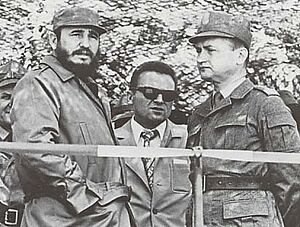
In August 1968, as defense minister, Jaruzelski ordered Polish troops to invade Czechoslovakia. This was part of a larger invasion by the Warsaw Pact countries. The Polish troops occupied northern Czechoslovakia until November 1968. In 1970, he was involved in removing the previous party leader, Władysław Gomułka. This led to Edward Gierek becoming the new leader. There are questions about his role in the harsh actions against striking workers in 1970. As Minister of Defense, he was responsible for the troops used. He later became a full member of the Politburo of the Polish United Workers' Party, the party's main executive body.
Leading the Polish Government
On February 11, 1981, Jaruzelski became the Prime Minister. On October 18, he also became the First Secretary of the Polish United Workers' Party. This made him the only professional soldier to lead a ruling communist party in Europe.
Soon after taking power, Jaruzelski met with Solidarity leader Lech Wałęsa and a Catholic bishop. He suggested forming a government that included the church and the union. However, his main goal was to control Solidarity. On December 13, 1981, Jaruzelski declared martial law in Poland. He said this was because Solidarity leaders were planning a coup. A military group called the Military Council of National Salvation was formed, with Jaruzelski as its head. This was done to stop the Solidarity movement.
Jaruzelski stated that martial law was needed to prevent the Soviet Union from invading Poland. He said that if he had been a Soviet general, he might have done the same thing to protect Soviet interests. However, some Soviet officials later denied that the Soviet Union planned to invade. For example, in 1981, a Soviet leader named Yuri Andropov said they did not intend to send troops into Poland.
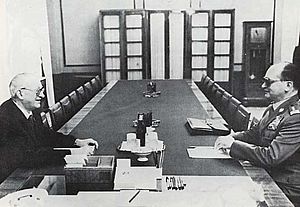
During martial law, Jaruzelski's government censored information and imprisoned thousands of opposition activists. Basic foods like sugar, milk, and meat were rationed. People's incomes also dropped. Between 1981 and 1989, many people left Poland.
Some historical evidence suggests that Jaruzelski actually tried to convince the Soviets to invade Poland to support martial law, but they refused. This meant the Polish government had to deal with the Solidarity "problem" on its own. However, Jaruzelski maintained that the threat of Soviet intervention was very real if he did not act. This issue is still debated by historians.
In 1985, Jaruzelski stepped down as prime minister and defense minister. He then became the Chairman of the Polish Council of State, which was like being the head of state. His power came from his close group of military generals.
Transition to Presidency and Retirement
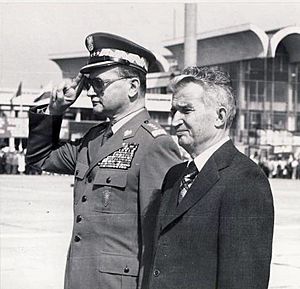
The changes happening in the Soviet Union under Mikhail Gorbachev encouraged political reforms in Poland. From February to April 1989, important talks took place called the roundtable talks. These talks changed the Polish government and society a lot. They led to a new system with two parts in the parliament. They also brought back the position of president as head of state. The Solidarity union was also made legal again.
In the elections that followed, the communists and their allies won 65 percent of the seats in the lower house of parliament (Sejm). But Solidarity won all the other elected seats. They also won 99 out of 100 seats in the Senate. Despite this big defeat, Jaruzelski allowed the results to stand. He was then elected president by the parliament. He was the only candidate.
Jaruzelski tried to get Lech Wałęsa to join a "grand coalition" government with the communists, but Wałęsa refused. Jaruzelski resigned as the First Secretary of the communist party in July 1989. Wałęsa then convinced the communist party's allies to break away. Jaruzelski had to appoint a Solidarity member as prime minister. Tadeusz Mazowiecki, who helped with the roundtable talks, became the first non-communist prime minister in an Eastern Bloc country in 40 years.
Jaruzelski resigned as president in 1990. Lech Wałęsa succeeded him after winning the presidential election on December 9. On January 31, 1991, Jaruzelski retired from the army.
Life After Retirement
After retiring, Jaruzelski continued to be a public figure. In 1994, he was attacked by an older man who had been imprisoned during martial law. Jaruzelski's jaw was injured and needed surgery.
In 2001, Jaruzelski said he believed communism had failed. He stated that he was now a social democrat, which is a political idea that combines some socialist and democratic principles. He supported the new leaders of Poland who came from the former communist party.
In 2005, Russian President Vladimir Putin gave Jaruzelski a medal to celebrate the 60th anniversary of the victory over Nazi Germany. Some people, like the Czech President Václav Klaus, criticized this because Jaruzelski was involved in the 1968 invasion of Czechoslovakia. Jaruzelski said he had apologized for that decision, calling it a big "political and moral mistake."
In 2006, Polish President Lech Kaczyński awarded Jaruzelski a Siberian Exiles Cross. This medal is for Poles who were sent to Siberia. However, after public criticism, Kaczyński said it was a mistake and Jaruzelski returned the cross.
Jaruzelski faced health issues in his later years. He died on May 25, 2014, in a Warsaw hospital after a stroke. He was buried with military honors at Powązki Military Cemetery in Warsaw. The decision to bury him there caused some protests.
Personal Life
Jaruzelski married Barbara Halina Jaruzelska in 1961. They had one daughter, Monika, who was born in 1963. Monika has a son named Gustaw.
Legacy and Impact
The legacy of Wojciech Jaruzelski is still debated in Poland. For some Poles, especially those who remember the Solidarity movement, he is seen as a controversial figure. However, opinion polls in 2001 suggested that many Poles were open to his explanation that martial law was put in place to prevent a Soviet invasion.
Some historians and writers have described Jaruzelski as a "tragic believer in Communism." This means he might have truly believed in the communist system but made difficult choices that had negative consequences.
Written Works
- Różnić się mądrze (English: To Differ Wisely; 1999).
- "Być może to ostatnie słowo (wyjaśnienia złożone przed Sądem)" (English: "It may be the last word (explanations given in the Court)"; 2008).
Images for kids
-
Jaruzelski (second from right) with other communist leaders and members of the Warsaw Pact, Berlin, 1987
See also
 In Spanish: Wojciech Jaruzelski para niños
In Spanish: Wojciech Jaruzelski para niños
 | Sharif Bey |
 | Hale Woodruff |
 | Richmond Barthé |
 | Purvis Young |


